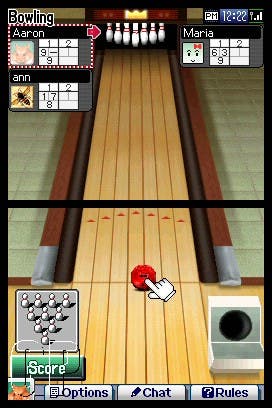42 All-Time Classics
Nintendo goes back to its roots.
There's going back to your roots, and then there's going back to your roots. New Super Mario Bros might have partied like it was 1989, but 42 All-Time Classics winds the clock back a further hundred years, to Nintendo's birth as a manufacturer of playing cards. Maybe that part of the company's history now only exists meaningfully deep in the echoing, marbled halls of retired president (and family heir) Hiroshi Yamauchi's memory, but that's still a pretty important place when it comes to Nintendo. And it certainly won't be lost on the old bird that the company's current burning desire to be all things to all demographics has brought it full circle, turning the DS into a vehicle for something Nintendo was peddling back in the late 19th century: social games with good old-fashioned family values. Er, and gambling.
42 All-Time Classics is just that, a compilation of 42 games - card games, board games, bar sports - most of which predate the video variety by decades if not centuries. Blackjack, Texas hold 'em poker, chess, bowling, Ludo, dominoes, solitaire, battleships (under the clumsy title 'grid attack', presumably for copyright reasons), draughts, Othello (here called 'turncoat'), darts, billiards, rummy, backgammon, sevens, even hangman and a game where you scribble on the touch screen to shake a soda bottle and pass it on. It is, basically, a country pub, a students' union and a 1970s suburban dinner party (minus the rosé and marital infidelity) all rolled into one, packed onto a tiny game card and put at the tip of your stylus.
It is an idea so dumbfoundingly simple and brilliant you can scarcely believe you didn't conceive and code it yourself in a spare afternoon ten years ago. But ten years ago the DS didn't exist, and without it, 42 All-Time Classics would have been a forlorn fraction of what it is. The twin screens are a great asset in presenting most of the games, for scoreboards and keeping track of turns, if nothing else. The touch screen is the perfect interface, even better than a mouse for moving pieces around a board, flicking cards into play, stroking a bowling ball down the lane. And of course, the majority of these games are for more than one player, so 42 All-Time Classics brings the full force of the DS' considerable social skills to bear, offering all but its three single-player games for online or local wireless play, full download play support for friends without the game, built-in PictoChat for local play and between friends online, simple self-translating chat phrases for online use, and even the facility to send any one of the games as a gift to be stored in memory until the recipient's DS is turned off. And - this is of vital, life-changing importance to all of you, so pay attention - it means you can play solitaire on the bus.

A sticky, unconvincing and out-of-scale game of billiards aside, the execution is near-flawless throughout. The only niggles we can bring ourselves to raise are cheap and slightly unfair shots at the multiplayer set-up. Given that so many of the games are turn-based, it's a shame there's no option to play on one DS, just passing it around; but we can hardly blame Nintendo for ignoring its commercial imperatives there. 42 All-Time Classics has, after all, been engineered as a kind of expensive, entertaining virus that can spread itself and sell itself, and quite probably sell DSes too to people who never thought they wanted one. Secondly, unless you're setting up a room with friends, it can be a chore finding a game online; there's no option but to keep trying different games (remember, there are 42 of them) until you find one someone else wants to play, and it may not be one you want to.
What's most surprising, perhaps, is how well 42 All-Time Classics works in single-player. Only a handful of the games are locked in free play, giving you extensive access to whatever you want from the off. But it's not much of a chore to unlock those few by playing Stamp mode, a simple trawl through all the games in order in which you collect more stamps and so progress faster if you win. The difficulty of the AI is pitched a little erratically, but Stamp is still a fabulously engrossing waste of time. It also works as an excellent tutor in games you don't know, thanks to written rules for each game, plus optional automatic card-sorting and hints. The Mission mode sets tough conditional challenges for each game (get rid of your hand in 90 seconds, win draughts with ten pieces left, go rummy - sounds uncomfortable) in return for, brilliantly, pictures of cats. And who doesn't love a cat picture?
It's pretty hard to imagine anyone not loving 42 All-Time Classics either. Of course, it isn't actually a game, and it's impossible to review it as such: we're not arrogant enough to pass judgement on designs that have stood for hundreds of years, except to say that you're bound to find old favourites, discover new ones, and hate some others in this comprehensive collection of games of luck and strategy. Like the Opera browser, 42 All-Time Classics is a software package, and a brilliant one, the perfect match for its format and the perfect Christmas present for a Mum who's finally bored of Brain Training. More than that, it's so adaptable, so sociable, so easy to enjoy in any situation (over lunch, between train stops, with your least favourite uncle) that it's nothing less than an essential component of any DS library, and one that just might put a lot of the DS' actual videogames to shame. And it's a steal at £20 too. Not wanting to turn your DS into the second most expensive dedicated solitaire player in your house is the only reasonable excuse for not picking it up.








